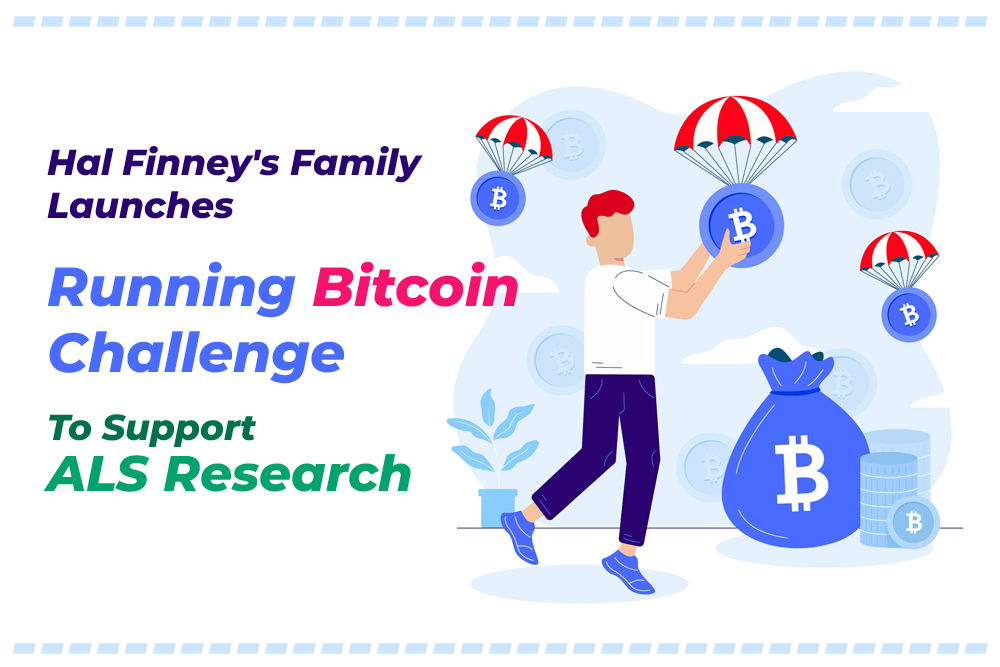
The Running Bitcoin Challenge: Honoring Hal Finney’s Memory and Supporting the Fight Against ALS
Hal Finney was a renowned computer scientist and cryptocurrency developer known for his contributions to the development of Bitcoin. In 2008, he received the first-ever Bitcoin transaction from Satoshi Nakamoto, the pseudonymous creator of Bitcoin. Tragically, Finney passed away in 2014 due to complications from Amyotrophic Lateral Sclerosis (ALS), also known as Lou Gehrig’s disease.
A Half Marathon Fundraiser for a Good Cause
In honor of Finney’s legacy, his spouse Fran Finney has organized the Running Bitcoin Challenge, a half marathon fundraiser that takes place between January 1 and January 10 each year. Finney was an avid runner before being diagnosed with ALS in August 2009. Despite a long battle with the disease, he was cryonically preserved in 2014. The Running Bitcoin event serves as a way to honor his memory and raise funds for an important cause. Those who donate at least $100 will receive an official Running Bitcoin T-shirt, and the top 25 fundraisers will receive a rare Hal Finney collectible.
The First Bitcoin Transaction and a Tweet That Changed the World
This timing coincides with the anniversary of Hal Finney’s famous “Running Bitcoin” tweet, in which he announced that he was contributing to the code to the Bitcoin codebase in 2008 and early 2009, and he was the recipient of the first-ever Bitcoin transaction, in which Satoshi Nakamoto sent him 10 BTC. Finney was a pioneer in the field of computer science and a strong advocate for privacy and civil liberties. His work in these areas continues to inspire others to fight for these values.
A Decentralized Event That Can Be Participated in From Anywhere
Participants in the Running Bitcoin Challenge can run, walk, roll, or hike the equivalent of a half marathon (Finney’s favorite distance) either in one go or over the entire 10-day period. There is no set location for the challenge, so participants can join from anywhere they wish. Those who donate at least $100 will receive an official shirt with the half marathon’s logo, and the top 25 fundraisers will receive a Hal Finney collectible signed by his wife. The Running Bitcoin Challenge serves as a way to honor Finney’s memory and raise funds for the important cause of finding a cure for ALS.
The Running Bitcoin Challenge has been a successful fundraiser, raising hundreds of thousands of dollars for ALS research. In addition to supporting research, the challenge also serves as a way for people to honor Finney’s memory and pay tribute to his contributions to the world of cryptocurrency.
Support the Cause and Honor Hal Finney’s Memory
By participating in the Running Bitcoin Challenge and raising funds for ALS research, individuals can help make a difference in the fight against this devastating disease and honor Finney’s memory at the same time. The event is being held in cooperation with the ALS Association Golden West Chapter, which provides equipment loans and educational materials to people living with ALS.
One of the unique aspects of the Running Bitcoin Challenge is that it is a decentralized event, meaning that it can be participated in from anywhere in the world. This makes it accessible to people from all walks of life and allows for a diverse group of participants to come together in support of the cause.
Overall, the Running Bitcoin Challenge is a unique and meaningful way to honor the memory of Hal Finney and support the fight against ALS. It is an opportunity for the cryptocurrency community to come together and make a difference in the world.
Open your free digital wallet here to store your cryptocurrencies in a safe place.
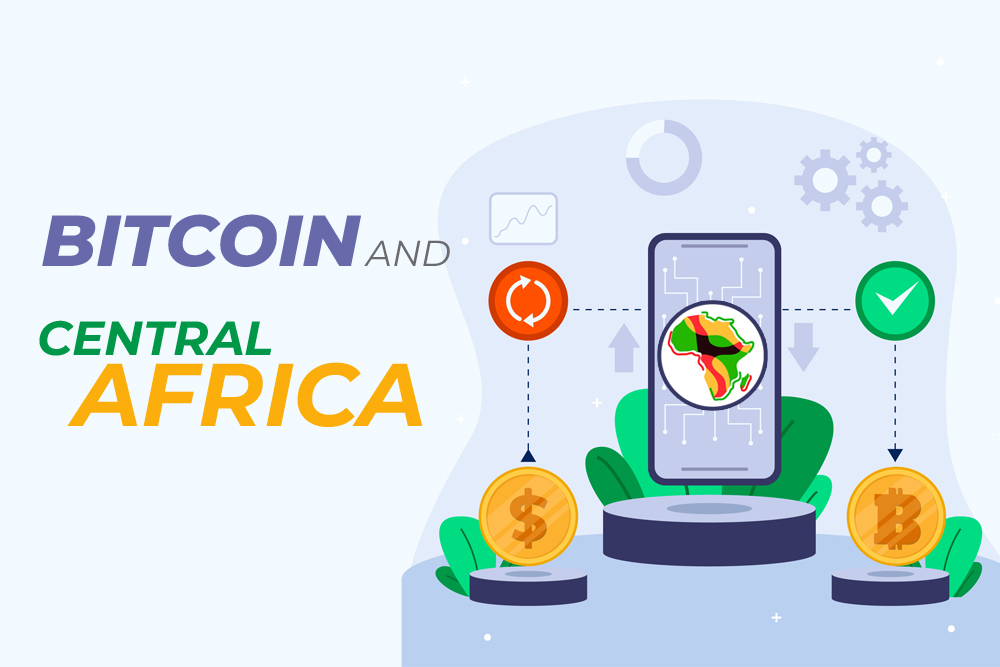
Bitcoin, the world’s first decentralized digital currency, has seen growing adoption in Central Africa in recent years. This trend is driven by a number of factors, including the region’s high inflation rates, political instability, and lack of access to traditional banking services.
One of the main reasons for the adoption of Bitcoin in Central Africa is the high inflation rates that many countries in the region face. Inflation erodes the purchasing power of a currency, making it difficult for people to save and plan for the future. By using Bitcoin, which is not subject to inflation, individuals and businesses in Central Africa can protect their wealth and preserve its value over time.
Political instability is another factor driving the adoption of Bitcoin in Central Africa. Many countries in the region have a history of coups, civil wars, and political unrest, which can lead to the confiscation of assets and bank accounts. By using Bitcoin, which is decentralized and not controlled by any government or institution, individuals and businesses in Central Africa can protect their assets from seizure and avoid the risks associated with political instability.
In addition to high inflation and political instability, many people in Central Africa lack access to traditional banking services. In some rural areas, there are no banks or financial institutions, making it difficult for individuals and businesses to access credit, save money, and make payments. By using Bitcoin, which can be easily accessed and used with a smartphone and internet connection, people in Central Africa can enjoy many of the same benefits of traditional banking without the need for physical infrastructure.
The adoption of Bitcoin in Central Africa is also supported by a growing ecosystem of businesses and services that accept the cryptocurrency. This includes merchants who accept Bitcoin for goods and services, as well as exchanges and wallet providers that facilitate the buying and selling of Bitcoin. This ecosystem is helping to drive the adoption of Bitcoin and is making it easier for people in Central Africa to use the cryptocurrency in their daily lives.
In addition to the factors mentioned above, there are several other reasons why Bitcoin is gaining popularity in Central Africa. The increasing use of mobile phones and internet access in the region has made it easier for people to use Bitcoin and other digital currencies. The growing awareness of the benefits of Bitcoin, such as its decentralized nature, low transaction fees, and fast transaction times, has also contributed to its increasing popularity in the region. The growing adoption of Bitcoin in other parts of the world has also played a role in its acceptance in Central Africa.
Furthermore, the Central African Republic has recently unveiled its own cryptocurrency, Sango Coin, which will be the second cryptocurrency, after Bitcoin, to be recognized as legal tender in the country. The President of the Central African Republic has voiced support for blockchain, cryptocurrencies, and Bitcoin, further demonstrating the increasing interest and involvement in the cryptocurrency space in the region.
Overall, the adoption of Bitcoin in Central Africa is driven by a combination of economic, political, and technological factors. As the ecosystem of businesses and services that accept Bitcoin continues to grow, it is likely that the adoption of the cryptocurrency will continue to increase in Central Africa.
Open your free digital wallet here to store your cryptocurrencies in a safe place.

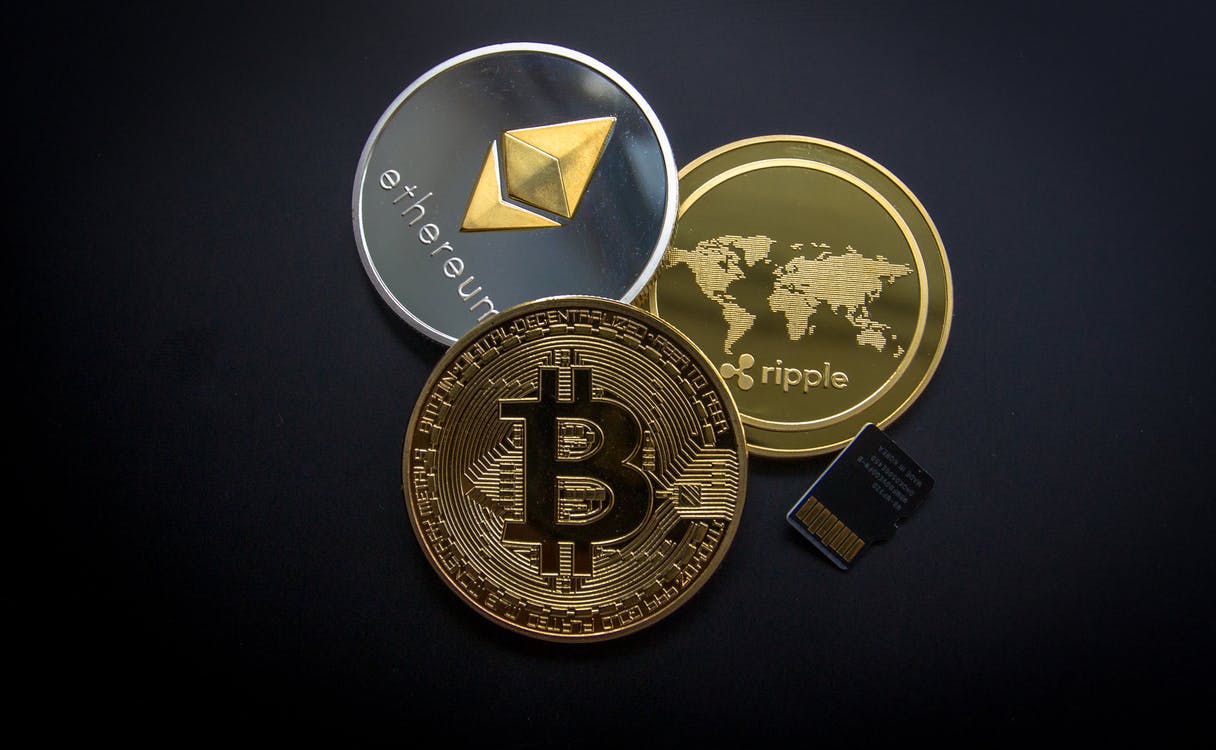
Cryptocurrency users are still a small minority. The total number of users was at 106 million as of January 2021. That sounds like a lot, but when you consider a global population that is nearing 8 billion, you can see that it is just a tiny fraction of people using crypto.
Whether you are in crypto or not, it is going to have an increasing effect on business. You can see Bitcoin mining operations selling shares on stock exchanges, large businesses looking into uses for crypto coins, and more people taking an interest in buying and using cryptocurrency.
At the current trend, crypto coins are becoming more common every year. If it holds, it might not be a matter of if people start using different cryptocurrencies, it could just be a question of when.
In the digital age, businesses are now connected internationally like they never before. Beyond the large multinationals, it is increasingly becoming common for smaller businesses to have significant international connections. This is not only true as it concerns deals with other companies, but businesses now have employees or contractors they work with from around the world.
Using cryptocurrency as a medium of exchange for international transactions could solve a lot of problems for these businesses. First, cryptocurrency could ease the burden of having to convert currency for several different countries. Beyond that, it could also make transactions faster, cheaper and more convenient by cutting out the traditional middlemen that would typically be in the middle of these transactions.
One of the factors that have held back many cryptocurrency markets is the lack of support from mainstream institutions. Banks wouldn’t let you make transactions with crypto exchanges, and it was hard to find businesses that would allow you to use your cryptocurrency. This is changing rapidly.
Beyond the ability of investors to use an ultra fast trading app to make trades, we now see a range of big institutional investors buying cryptocurrency. Along with that, some of the world’s largest financial businesses are starting to work with crypto. As an example, PayPal started offering a range of cryptocurrency services earlier this year. You also have major credit card companies that are starting to work with crypto on a limited level.
One of the main claims of many crypto skeptics is that the coins have no inherent value. This is true in a sense. The value of most crypto coins is solely based on the perception of people in the market. While that might be true, you could make the same argument for most fiat currencies. The value is based on the fact that people will accept it in exchange for goods and services.
Crypto has an advantage over many fiat currencies: the fact that many crypto coins have a limited supply. As inflation acts on fiat currencies, crypto could grow in popularity as a hedge. In the future, many investors will hold crypto in the way that they hold gold as a protection against inflation.
Raising or distributing equity usually means creating conventional shares of the business. While this could be a way to raise money or provide value to employees, it does come with a range of hurdles. One way to get around many of these hurdles would be to create crypto coins that represent shares in the company.
Instead of jumping through all of the regulatory hoops to issue shares, the business could give people crypto coins as equity. Instead of holding an IPO, the business could do an ICO as a way to raise capital from investors.
With the rise in crowdfunding platforms, the ability to raise money is easier than it ever has been. These platforms not only make it easy to raise money from the public, but they also offer a level of transparency that is popular among those looking to donate or invest. With that said, these platforms often take a significant portion of the funds in fees.
Using a blockchain wallet for crowdfunding could be a way to get the transparency of a crowdfunding platform while avoiding the fees. This would allow those looking to raise funds to do so off a platform, but with the blockchain ledger, potential donors or investors could still see the donations coming in.
Crypto is a field that is always evolving. As businesses see the benefits and new applications become available, it will become more common. With that said, the markets are unpredictable. The only thing that we can be sure of is that there will be ups and downs along the way.
Open your free digital wallet here to store your cryptocurrencies in a safe place.

Short for decentralized finance, DeFi is a new wave taking over the world’s financial market; the cryptocurrency world. DeFi is the conception that entrepreneurs can provide traditional financial institutions functions through a decentralized medium. There are cryptocurrencies like Bitcoin and Ethereum, the former of which has been causing significant ripples in the crypto-world since the last quarter of 2020 and the beginning of this year.
Although Bitcoin and Ethereum are the forerunners of DeFi, newer and somewhat better altcoins are coming into view. An example is Dai, a bitcoin-resembling digital token that hopes to remain independent of the world’s central banks’ influence. Unlike centralized finance and traditional banks, DeFi takes away all the cumbersome operations, go-betweens, and high costs often involved. This it does via smart contracts and to the benefit of the end-user. The closure of many industries during this era of the COVID-19 pandemic has served as a wake-up call to consumers of fiat currencies on the futility and loss of value of such coins.
This wake-up call has been occurring in places where the government has been pumping more money into their economies even though they have taxes to be paid. Such practices make the value of such currencies questionable. As a result of such act, fiat currencies’ values have been seen to fluctuate and fall considerably, often leading to inflation. An example is in Venezuela’s economy where inflation has risen by more than 1,000,000% due to the influx and pumping of more bills into the economy.
Often, the influx of newly minted bills into the economy does not mean these bills will get to such currencies’ end-users. These often serve as injections into the banking sector. But when they come as benefit checks and government aids, this inflation in money supply results in taxes. Also, they help boost the stock market and the stocks of the top 1%, rather than help the thousands and millions of individuals and businesses that need such aids.
The increasing dissatisfaction and discontent with traditional banks and centralized financial systems are momentous. The high availability of information about the growing offers in the crypto sector is finally providing people with better alternatives to traditional banks. These alternatives come in the form of DeFi (decentralized finance) where people can now take part in a mode of operation that will work for them. This means that people’s money will now work for them instead of the other way round.
Investing in the cryptocurrency market is becoming more comfortable and more widespread than when it first emerged with Bitcoin as its forerunner. As the first DeFi system, this paved the way for other altcoins, including Ethereum, Tether, Polkadot, XRP, and Cardano. These cryptocurrencies have come a long way and have become potential collaterals when taking out traditional bank loans. These loans can be collected regardless of what your credit score is. They serve as a way of getting cash when you need it irrespective of the availability of physical collateral.
The influence of cryptocurrency is rising steadily in developing countries where inflations often caused by government policies and central bank cash injections result in the loss of value of people’s savings and business capitals. Buying and investing in DeFi systems has provided a remedy to that, whereby the value of fiat currencies that have been converted to cryptocurrencies experience growth and provide means of decentralized financial transactions with relatively low costs from traditional banks.
The opportunities created by cryptos seem even better in developed countries. Large amounts of money are readily available and can be invested in trusted cryptosystems where stable profit and immense gain are assured. This steady return has been made evident in Bitcoin and Bitcoin price prediction, which has been steadily increasing more than fiat currencies. Its independence from centralized financial systems has served as a contributing factor rather than a deterring factor.
Amidst the use of DeFi systems by individuals and some businesses, there is a need to increase its development and efficiency to encourage its adoption by institutions. Through this, the DeFi industry will rise from the position now as a Billion-dollar transaction pathway to a trillion-dollar one, where the costs of transactions go down while profits and investment increase. This aim of getting institutions into the DeFi industry is already in motion. Individuals and groups are coming together to develop decentralized financial apps that are better and more decentralized than their forerunner. Such a better DeFi system could come in the form of large and small security circles where a single user cannot overturn the currency’s stability, and a central body cannot determine a price change.
With this growth in the use of DeFi systems and the coming in of institutions into the crypto market, real-world assets can be brought into the blockchain, which will help and promote the growth of DeFi. This would include transferring trillions of fiat currencies and precious stones such as gold or silver onto the blockchain. And their movement can be done at the cost of no more than a nickel and no intermediary fees and liquidity limits. With DeFi as an alternative to centralized financial systems, governments will have little to no control over the wealth that cannot be generated by individuals that make use of the system.
With the growth of decentralized financial systems in the last two decades, the move from fiat currencies to cryptocurrencies seems irreversible. And that’s a good thing since, through DeFi systems, the distribution of wealth among crypto-users can be regularized and stabilized. This would ensure equal wealth distribution on the platform, which can only be influenced by cryptocurrency owners when they invest more fiat currency into the platform.
BIO John Edwards
John Edwards is a writing specialist who works at The Writing Judge. He is looking for ways of self-development in the field of writing and blogging. New horizons in his beloved business always attract with their varieties of opportunities. Therefore, it is so important for him to do the writing.
Open your free digital wallet here to store your cryptocurrencies in a safe place.


When people talk about the entertainment industry and media, blockchain isn’t exactly the first thing that comes to their mind.
Wall Street and eCommerce are way ahead of the entertainment industry in terms of blockchain adoption, there’s growing evidence that things could change pretty soon. As more and more use cases for the technology emerge, major players in the industry are increasingly looking at blockchain as something that has the potential to resolve some pressing issues.
Warner Music Group, for example, has recently joined an $11 million investment round in Dapper Labs, a blockchain company seeking to create Flow, a rival to Ethereum. Already, the company is exploring a number of use cases for the cryptocurrency, including sales of digital merchandise with financial tokens.
The slow but sure progress of blockchain in the media and entertainment might be a sign that a breakthrough might be approaching. Currently, the technology is known to provide the following solutions.
The problem of middlemen is persistent and very well-known in the music industry. Even though it has come so far in terms of technology, it’s still in the same place when it comes to compensation distribution. The biggest losers in this situation are often the artists, who end up with a lack of opportunities to get sponsorship contracts with big-time labels.
The only viable option for an artist to minimize the dependence on managers and distribution services is streaming services. However, the compensation they get for the music is often inadequate, even for the well-known artists. Here are some examples (source: CNBC):
All of this translates into between €0.004 and €0.007 of pay per play.
Blockchain can reduce artists’ dependence on labels and other middlemen because it’s not run by a central body but rather everyone on the network. This means that the financial transactions – compensation for songs, etc. – could be conducted without the involvement of the middlemen.
Contract distribution and payment for property in the entertainment industry can be a complicated thing. The biggest problem is the sheer amount of work involved in payment processing, making exclusive distribution agreements, providing licensing, and other things. On top of that, there’s high fees and a lack of control over the process for artists.
Many artists delegate these business administration responsibilities surrounding contacts, licensing, and payment to their agents. As a result, the artists are once again left with high losses because they simply cannot sell their work directly peer to peer.
“Since blockchain is a distributed digital ledger system, it can enable almost complete automation of all business administration work surrounding payments, contracts, and licensing,” says Jason Rowe, a technology reporter. “The biggest benefit here, however, is the ability to enable artists to license their content directly to customers.”
WeMark is one example. It’s a distributed marketplace for stock photography that seeks to reduce the dominance of agencies like Getty Images and Shutterstock. According to WeMark’s white paper, these agencies now charge photographers up to 85 percent of the photos’ sale price, so the latter are left with a fraction of potential earnings.
Here’s how the WeMark platform works to provide artists with distribution agreements.
The solutions offered by blockchain-powered marketplaces like WeMark include:
Once blockchain marketplaces get more popularity among artists, chances are good they will prefer to use them instead of agencies like Getty Images. Each of the marketplaces will accept the most common cryptocurrencies as a payment method; moreover, as the costs of crypto mining gradually go down as blockchain gets more acceptance, chances are that artists will be willing to use cryptocurrencies for peer-to-peer sales.
The number of visits to media piracy sites in 2018 rose to 17.3 billion in the U.S. alone. With the volume of video-based traffic rapidly increasing around the world, online media piracy has skyrocketed; in fact, the television and film industry estimates about $52 billion in lost revenues by 2022.
Blockchain might be one of the solutions that will finally start to battle online privacy effectively. Its main promise, more comprehensive protection of digital assets, is perfectly aligned with the goal of combating pirates. For example, the technology can allow artists to transfer media files securely while having the complete visibility of the operation.
Another benefit of bitcoin is allowing it to catch pirates by identifying illegally obtained files. For example, if you’re a moviemaker looking to distribute a file to reviewers, you can use a blockchain-powered video distribution platform that embeds a special code, or a wallet, in every copy that gets distributed. The code remains in the file despite conversions or other processing operations.
If the file is leaked and found, then identifying the presence of the code, therefore, an illegally obtained file, becomes possible. The adoption of blockchain is still a problem, but it’s clear that the technology is on the way to become the future of the anti-piracy tactics (Warner is already investing in a blockchain company, remember?)
When people hear blockchain, they tend to think about Bitcoin. However, the technology stands to benefit many industries, including entertainment, and is already showing some good progress. The industry is highly centralized and there’s a great potential to increase earnings for people doing the creative work.
As the applications of blockchain become more common and the benefits visible, it’s possible that artists will be more willing to use the technology. However, the massive adoption is still yet to come, so stay tuned to blockchain news.
About the author: Jessica Fender is a content editor for TopWritersReview.com and a tech blogger. She is passionate about technology trends and finding new ways to help students improve their skills and become more successful.
Open your free digital wallet here to store your cryptocurrencies in a safe place.
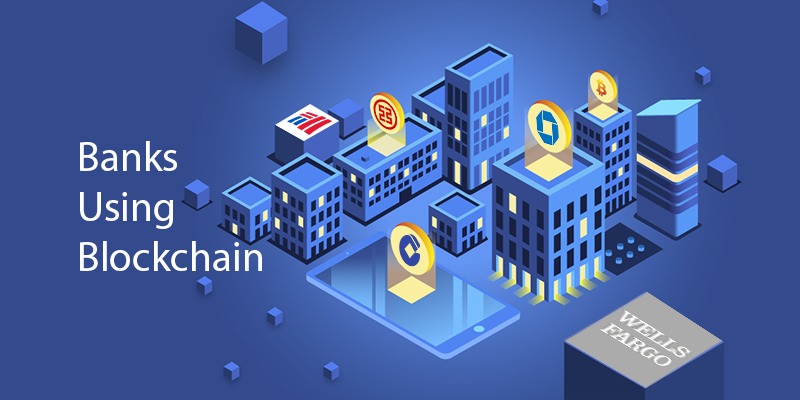
By far the biggest threat to banking in, well, living memory, has been blockchain technology. More specifically, cryptocurrency, but we’ll focus on the technology as a whole since this is what has been driving the movement.
All the tech companies in the world have been using it, including Google, Facebook, Apple, and Amazon, and a vast number of FinTech services, which is why it’s being seen as such a threat to traditional banks, but why is this happening?
What’s so important about blockchain?
In today’s post, we’re going to explore how and why blockchain technology is making such a big difference to the traditional banking format, and how the future of this industry is looking.

Source: Adarsh Goldar
First and foremost, and by far the biggest form of change that blockchain is bringing into the world, is how financial payments are made and the way modern-day payment systems work. Whereas traditional banks can take a few working days to make a payment, meaning some international payments can take a very long time, blockchain payments are instant.
Since all you need is an internet connection to make the transaction, most will be handled and completed in a matter of minutes. These transactions can happen across borders to anywhere in the world, are extremely secure (especially when compared to traditional methods) and happen pseudoanonymously.
Due to the nature of blockchain technology, the costs involved in these transactions are usually very small, typically only several cents per transaction. This means that sending money across to the other side of the world is far cheaper than traditional wire companies, such as Visa or Western Union.
In the same way, remittances are also changing. Whereas overseas remittances are expensive and long-winded, with high processing times and the fact the money can be stolen, taxed, or subject to legal issues along the way, a blockchain process basically eradicates all these issues. There are dozens of companies already set up and operating to offer these services.
In the traditional way the world works, consumers tend to use banks to hold money in either their savings or checking accounts. Then, the bank will loan out the money being held to make money on top of the money you’re saving, and the cycle continues. This means when you look into your bank account, much of the money you have isn’t actually being held by the bank, but instead is out in other people’s accounts as loans.
If every customer of a bank went to the bank and withdrew everything they had, the bank would collapse. It’s a very fragile system that many consumers are unaware of. However, while this system isn’t going to change any time soon, blockchain technology can make the management of this system far more effective.
Due to the benefits that blockchain technology provides, these account ledgers are far more secure, far more reliable, and far more accessible. This means banks can accurately manage their ledgers to ensure that they aren’t taking out too many loans and will actively help reduce the risk of bank run, or the system crumbling.
Fraud has always been a problem in the financial industry, and it costs people around the world billions of dollars every single year. However, for the similar benefits, we’ve spoken about above, blockchain is making things far more secure.
Since the vast majority of traditional banks are set up and organised around a centralised system, malicious people can target the centralised system to commit the acts of fraud. While there have been many measures to make the system as secure as possible, this isn’t fall-proof, and statistics show around 45% of all financial institutions are prone to fraud attempts.
Blockchain is a decentralised system, which means it’s everywhere and nowhere at the same time, which makes it incredibly difficult to fraud and theft to take place. There’s no single point of access like there is with a centralised banking system and trying to get into such a system means diving into layer upon layer of encryption, all spread out in hundreds of thousands of locations.
What’s more, every single change that takes place on the ledge is capable of being seen by every other person and system that has access to the ledger. This means if any fraudulent activity takes place, everyone can see it instantly and correct it. This will help protect people’s money and keep the system afloat.
Katherine Rundell is a finance writer at Academic Writing Services and Essay Writing Services. She writes about blockchain and banking and aims to help the world get educated about finances in a time where they can seem so out of control.
Open your free digital wallet here to store your cryptocurrencies in a safe place.
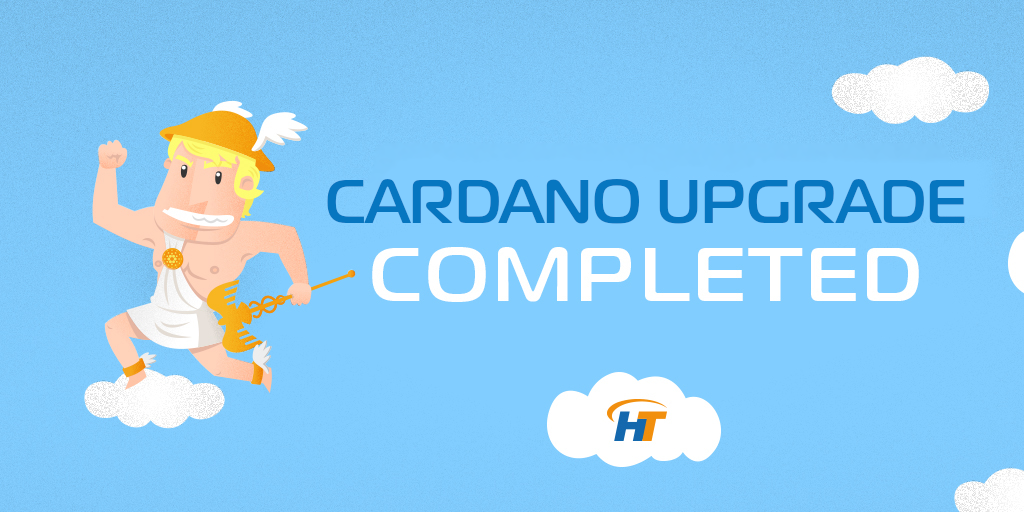

Sending and receiving ADA with Cardano‘s Byron and Shelley-era addresses is available on HolyTransaction now.
Open your free digital wallet here to store your cryptocurrencies in a safe place.
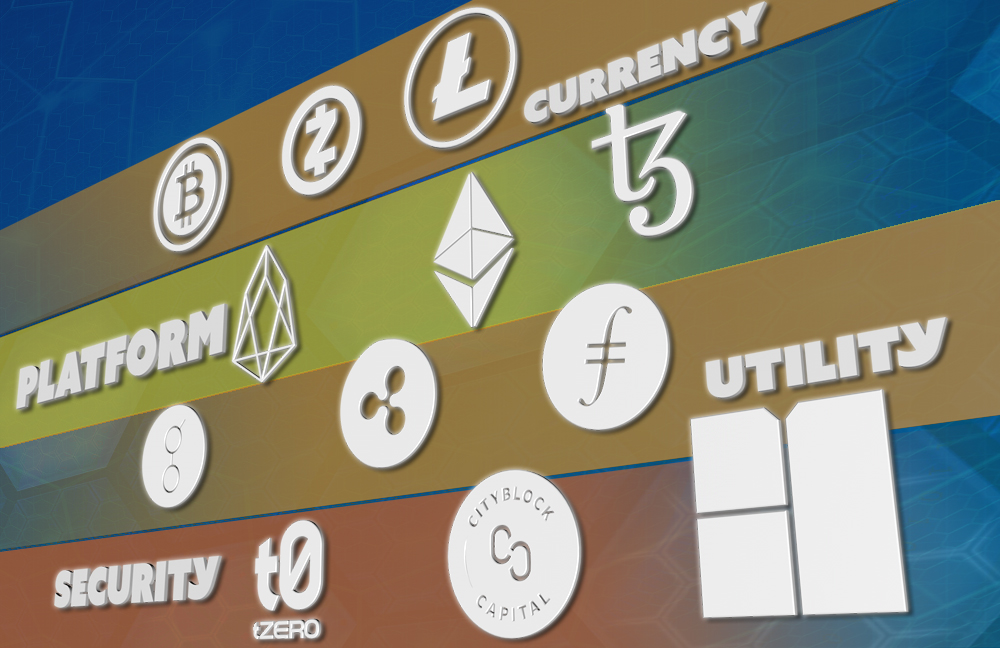

Image courtesy of GammaLaw
Digital currencies have created a buzz since the sudden rise of the Bitcoin price. They have, over time, become a new trend in the global money market due to their incredible benefits. Here are some of the aspects that tend to make cryptocurrencies so important.
Bitcoin and Litecoin are arguably the most trusted and safest digital currencies in the world. In a world where looters and cons are everywhere, virtually everyone wants to trade safely. Cryptocurrencies give online traders that assurance, and that’s why people consider them as a reliable means of exchange.
The recent increase in the demand for Litecoin and Bitcoin can be attributed to policies that govern cryptocurrency networks. Cryptocurrencies are a digital currency, which means traders rarely need a third-party to complete a transaction. That often gives online traders a sense of security and reassurance. Cryptocurrencies tend to allow online retailers to transact anytime and anywhere.
Bitcoin and Litecoin are considered a low-cost means of transaction. The cost of transacting with cryptocurrencies can be far less than other currencies. The fact that the cryptocurrency network is responsible for compensating miners tends to eliminate transaction fees. Low-cost transactions could mean that cryptocurrency users won’t shell out money in exchange for Bitcoin and Litecoin. All a cryptocurrency user may need to transact is knowledge of cryptocurrencies and a smart phone.
Cryptocurrencies can be stored in a safe e-wallet or USB drive. Storing your bitcoin or Litecoin in either an e-wallet or USB drive may not attract any fee.
Privacy has been a concern for most people transacting over the internet. Cryptocurrency users can expect their financial transactions to be highly confidential. You can transact using bitcoin and still be anonymous. With digital currencies, the seller and buyer don’t transfer money directly. Instead, the cryptocurrency network often serves as an intermediary, which means that users may not share their credentials with anyone. Cryptocurrencies can be used as a new measure to curb identity theft, which has become a menace in the global money market. If something seems doubtful, you are at liberty to share any information you may want with your merchant. By accepting payment in digital currencies, online traders tend to accept and welcome clients who would wish to remain anonymous. Accepting payments in bitcoin can make a brand an industry leader and increase its awareness.
Cryptocurrencies can be bought in a fraction. That means you can invest any amount of money in cryptocurrencies. For example, if you can’t afford a full unit of bitcoin, you can split it and invest in a quarter or half of it. That can help reduce the cost of investing in cryptocurrencies and avoid overspending. With a crypto converter, an investor can find out the price of any digital currency in their country.
Using digital currencies can make you autonomous. Cryptocurrencies tend to eliminate third-parties, so you can be sure that no fees or commissions are involved. These currencies can also allow online traders to manage their accounts.
Decentralization is a feature that often makes cryptocurrencies lucrative for merchants and customers alike. It means that digital currencies can’t be subservient to any authority or agency. No one owns digital currencies, which means no individual can have control over it. Digital currencies can provide online retailers with the freedom to transact without worrying about geographical barriers.
Digital currencies are considered a game-changer in the global money market. Their incredible benefits are arguably the reason behind their recent popularity. Cryptocurrencies are considered the safest and most trusted currencies around the world. You can store Bitcoin and Litecoin in the cloud or USB drive and move with them anywhere around the world. By using bitcoin, online traders can expect their transactions to be confidential. Digital currencies are also a reliable medium of exchange that can give sellers and buyers control over their accounts. The fact that Bitcoin and Litecoin can be bought in a fraction can make digital currencies an affordable investment.
Open your free digital wallet here to store your cryptocurrencies in a safe place.


Once again, we recently listed Digibyte and expanded our collection.
In case you are searching for a reliable and easy to use digital wallet, then HolyTransaction Cryptocurrency Wallet is perfect for you. A digital wallet is ideal for cryptocurrency traders who are looking to store, trade, and send, as well as access their cryptocurrencies through a single account. This way users can easily convert the supported cryptocurrencies without having to transfer their coins to other exchanges.
As a HolyTransaction customer, you can create a new address for DGB (Digibyte) and use the HolyTransaction Web Wallet to send as well as receive coins. You can also use the wallet to convert them into any other cryptocurrency conveniently. Thus, HolyTransaction users can send cryptocurrency, receive transactions, as well as exchange DGB with other supported cryptocurrencies, with Digibyte being one of the latest coins to be included.
Digibyte is a rapidly-growing, public, decentralized blockchain project, which features a cryptocurrency of the same name. The project has been around for a long time, with some of the fastest transaction speeds in the industry composed by an active development team which has been consistently working on it for over 5 years.
Digibyte has also always been transparent, with its team and founder never hiding their identities. DGB can be obtained through mining, purchased on HolyTransaction, or received as payment. In addition to that, the Digibyte team has been making an effort to reach out to merchants without waiting for them to come to cryptos, in an attempt to provide more options to its users as possible.
DigiByte has been active for over 5 years now with a market cap of $69.8 million, which makes it at least as old as Ethereum while DGB itself ranks as the 70th-largest crypto.
Open your free digital wallet here to store your cryptocurrencies in a safe place.
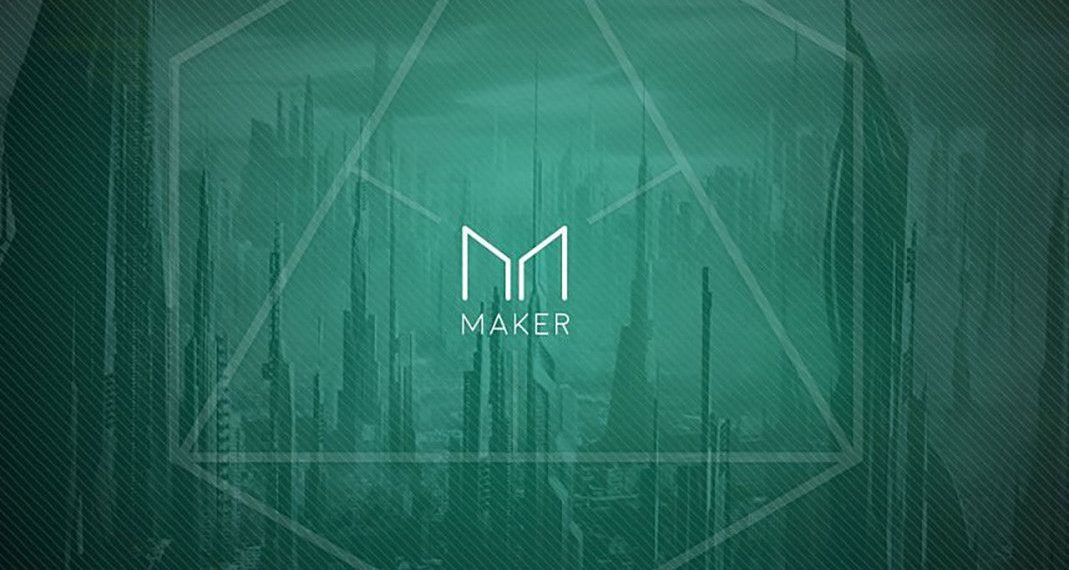
As of today, you can instantly purchase MKR on HolyTransaction, transfer them to any HolyTransaction’s customer for free, and do crypto-to-crypto swaps between your Wallet MKR and more than other 30 cryptocurrencies.
MakerDAO it’s a prime example of Ethereum’s smart contract platform.
Maker is a decentralized autonomous organization on which the MKR token and DAI operate, and it is built on Ethereum. Essentially, it exists to reduce the price volatility of the Dai against the US Dollar. MakerDAO’s native cryptocurrency token is MKR, which can be stored on HolyTransaction now.

Dai and MKR are dependent on each other to operate, Dai offers stability, while MKR offers involvement and potential on MakerDAO.
As the technology and methodology behind MakerDAO continues to progress the future of stablecoins and DAO are certain to bring interesting evolution to the cryptocurrency economy.
All HolyTransaction customers can create a new address for MKR and use the simple HolyTransaction Web Wallet to send and receive transactions or to instantly convert them to any other cryptocurrency.
Just like with Bitcoin, you can:
To add Wallet Storj just click on the “plus” button you find at the top right of the balance page, once you successfully enter into your wallet.
You can find the “plus” button to select the wallets you want to see in the main page like shown in the picture below:
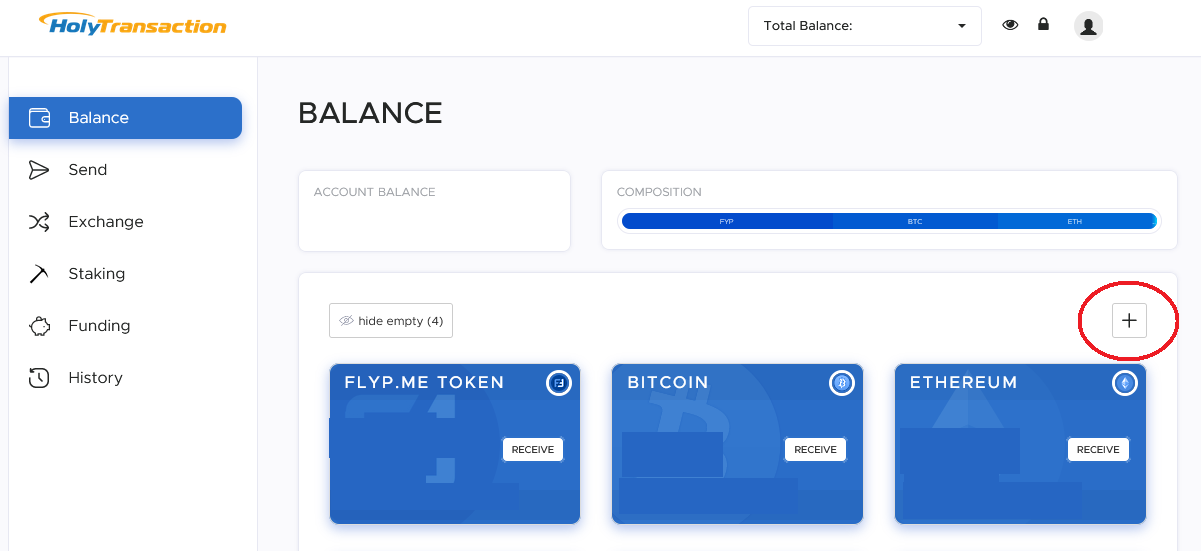
We’re excited to be part of the STORJ community!
NOTE: Our multicurrency wallet can store more than 30 cryptocurrencies, including: Bitcoin, Dash, Ethereum, Dogecoin, Litecoin, Decred, Zcash, Dai Stablecoin, DigixDao, Augur, 0x Project, Gamecredits, Enjin Coin, Blackcoin, Gridcoin, Aidcoin, Peercoin, Syscoin, Groestlcoin, Power Ledger, BAT, BlockV, PIVX, TrueUSD, Cardano, STORJ, Monero and MakerDAO among the others.
Open your free digital wallet here to store your cryptocurrencies in a safe place.